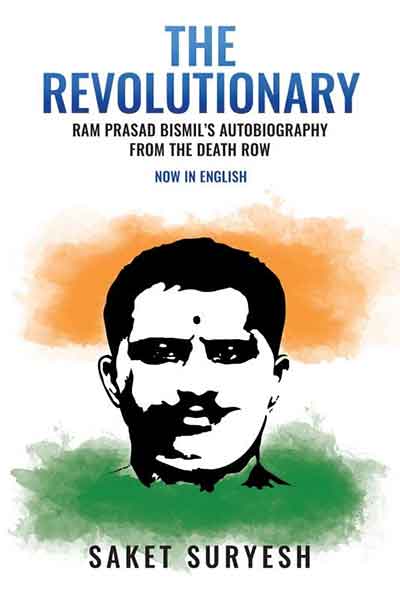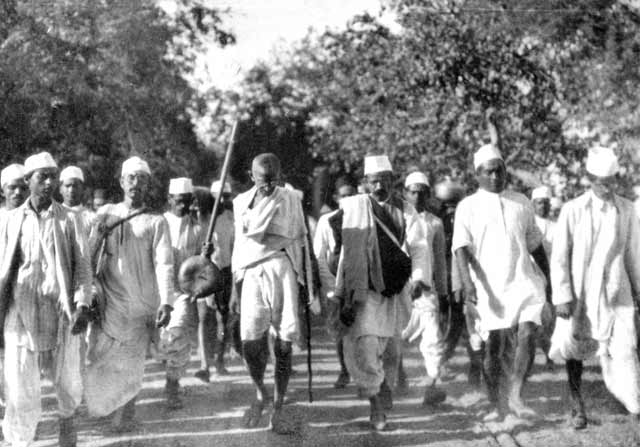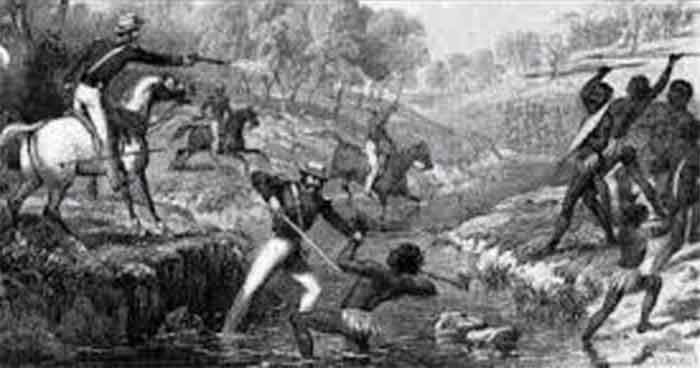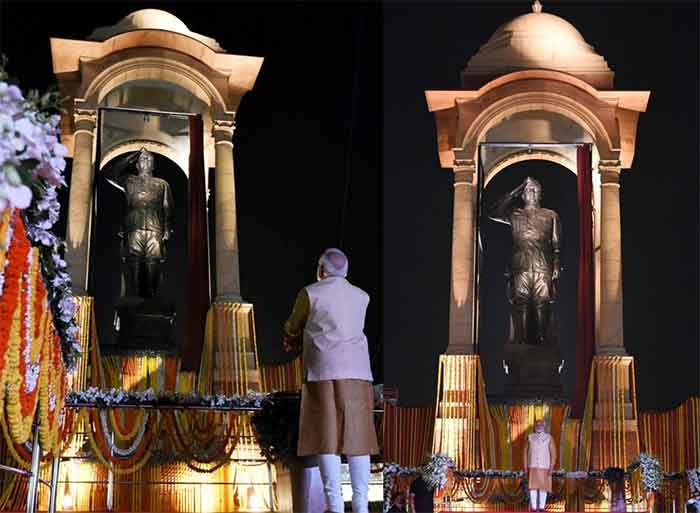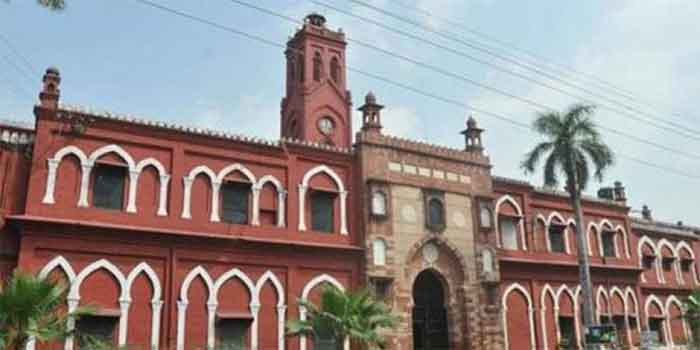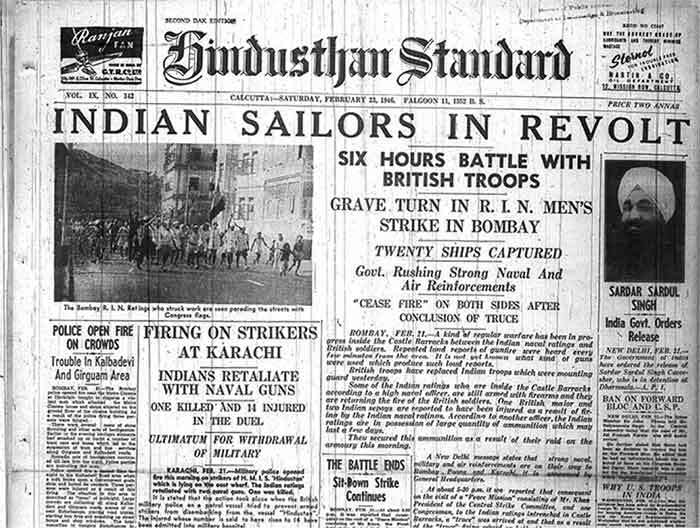
75 years ago on February 18th 1946, the Indian Navy launched a historic mutiny that will live in our hearts forever and win a permanent place in the annals of history. The British rulers were struck at their very chord or death knell. Hindus with their Muslim brethren rose up with the spirit of tigers to confront the colonial power. It was organised with the skill of a sculptor and force of a boxer. Ironically Congress leaders like Sardar Vallabahai Patel ,Jawaharlal Nehru and MK Gandhi condemned it as treason. The bond between Hindus and Muslims of that time must be ressurected which would give a fitting blow to the dictates of the neo-fascist Saffron brigade today. The Congress leaders later and today’s BJP Saffron brigade robbed the INA martyrs of all their glory. The Naval Ratings mutiny should be rekindled in another form to deliver a deathblow the current of Hindutva fascism.
At this juncture in Indian History rebellious feeling within the ranks of the army was simmering at boiling point as well as in all other sections of the people. It was doubtful whether even the British colonial army could have withstood a possible rebellion. The turn of events was shaping a massive upheaval penetrating the very heart of British rule.
The morning after February 18, somewhere between 10,000-20,000 sailors joined the strike, as did shore establishments in Karachi, Madras, Calcutta, Mandapam, Visakhapatnam, and the Andaman Islands.
While the immediate trigger was the demand for better food and working conditions, the agitation soon turned into a wider demand for independence from British rule.
The protesting sailors demanded the release of all political prisoners including those from Netaji Subhas Chandra Bose’s Indian National Army (INA), action against the commander for ill-treatment and using insulting language, revision of pay and allowances to put RIN employees on a par with their counterparts in the Royal Navy, demobilisation of RIN personnel with provisions for peacetime employment, release of Indian forces stationed in Indonesia, and better treatment of subordinates by their officers. The mutiny was a result of continuous grievance among the ratings of one ship, the Talwar.In no time it sprinkled to the Castle and Fort Barracks or shore and 22 ships to the Bombay Harbour.News of the Ratings simmered similar mutinies in Karachi,Calcutta,Vizag,Jamnagar,Cochin,Madras and the Seas.An impact was made on the Army and Airforce,too.By february 20th the strike spread to 74 ships ,four flotillas,,and 20 shore establishments.A Naval strike Commitee was elected in Bombay comprising Muslim,MS Khan, and a Sikh,Madan Singh was elected. Historian B.C.Dut states “Ratings from every ship and from the shore establishments started marching towards the Talwar.The streets of Mumbai resounded to their slogans, calling for national Unity. It was a strange sight for the people of Bombay: the ratings marching through the streets with party flags of the Congress and the League tied together to symbolise national unity. Crowds of people thronged the roads to watch the sight. The ratings were now on the road not to suppress the people but to spread the message of unity and revolution.
General ranks of the people like the shopkeepers and restaurant owners gave fraternal support, providing them free food. They appealed to the British not to fire on mutineers after the Indian troops under British command encircled them at Castle Barracks.On February 22nd the working class stepped its feet in support .
What is relevant is that the protestors did not only voice economic or partial demands but also political demands like the release of political prisoners, including Subash Chandra Bose and INA Personnel, and withdrawal of all Indian troops from Indonesia. The seeds were sown or ground launched to implement a political programme.20000 INA cadre who posessed arms and ammunition, were waiting for orders from the national leadership. Thus the movement had knit the base for the crystallisation of a major anti-colonial movement, integrating with many other movements with its cohesive nature.
The Supression of the mutiny was a perfect testimony of how the Congress leaders were hand in glove with the British rulers in supressing any genuine democratic revolutionary resistance. There could be no better illustration of how in the name of ‘Non-Violence’ genuine democratic resistance was branded as Violent by the Congress leaders with the instance of the betrayal to the Naval mutineers in perfect harmony with the preceding events ,like in Garwhali in 1938.Patel,Nehru and Gandhi gave absolutely no vent to the feelings of the mutineers and indirectly banged every nail in the coffin to shut the boiling lid of indignation.It was ample proof how Gandhian non-violence championed the interest of the powerful and mighty and justified suppression of the oppressed.
It taught us the inherent revolutionary potential of the Indian people within the Congress ranks, which were vehemently supressed or thrown into rebellion .It was diverting such secular uprisings that paved the way for religious communal forces to breed or fervour and thus lead to the Partition. The tremors it caused in the hearts of a Nehru, Patel or Gandhi testifies how in essence they opposed the moral liberation of the Indian people.
Today such an event should repeat itself in another form to overcome the slavery of neo-colonialism. Our navy is an appendage of or subservient to US Imperialism and supports its hegemony. It patronizes the Neo-colonial designs of the Imperialist superpower. The mutiny was a perfect illustration of India’s capacity to physically emancipate itself from the British. This is hardly taught in the schools. It is a distortion of history not to glorify the naval mutiny. It should inspire the movement against the tyranny of Hindutva fascism.Democratic forces need to re-invent or reshape such an uprising in the present context to challenge the Hindutva fascism ,and break the backbone of the RSS with Muslims joining Hindus.
Since Independence the Indian Navy carried projects or exercises with the patronage or endorsement of US Imperialism and USSR Social Imperialism. After the demise of USSR indirectly it has championed the interests of US hegemony. Indo-US Naval exercises have been launched which have promoted Indian expansionism or chauvinist tendencies to neighbouring countries. Missile bases were constructed sponsored by designs of imperialist powers. The polices and aspiration sof our navy today is in contravention with the goals of the 1946 Naval ratings.
The Supression of the mutiny was a perfect testimony of how the Congress leaders were hand in glove with the British rulers in supressing any genuine democratic revolutionary resistance. There could be no better illustration of how in the name of ‘Non-Violence’ genuine resistance was branded as Violent by the Congress leaders with the instance of the betrayal to the Naval mutineers in perfect harmony with the preceding events ,like in Garwhali in 1938.Patel,Nehru nad Gandhi gave absolutely no vent to the feelings of the mutineers and indirectly banged every nail in the coffin to shut the boiling lid of indignation.
I have several memories of protests conducted by democratic forces protesting the military designs and in Mumbai even launching a memorial protest highlighting the relevance of the Naval mutiny. Revolutionary organisation sin Mumbai upto 1990’s held public meetings in memory connecting the issue to the monopoly of neo-colonial exploitation created by globalization and the expansionist ambition of the Indian rulers. We should remember it as Russians remember Battleship Potemkin.My heart bleeds that today we glorify the Congress and how the rulers today give no credence to the historic contribution and sacrifice of the 1946 Naval ratings Uprising. It should be a compulsory part of our history textbooks. It is ironic that there are certain ex-army people today who are critical of the current regime’s chauvinism. and nuclear ambitions. The concept of India becoming a superpower is glorified today which puts into oblivion the goal of a truly pro-people army.
Its is most laudable or praiseworthy how the mutineers confronted the lion in its very den. With the dialectical precision of an architect or surgeon it weighed the subjective strength of the British and galvanized and dispersed forces accordingly Meticulously it built fortresses to protect or insulate it from enemy attacks like a spider building a web. .Sustained resistance was launched to build a movement on the verge of delivering a final knockout punch.
DETAILS(Reproduced from Current Affairs-19th February 2020)
The morning after February 18, somewhere between 10,000-20,000 sailors joined the strike, as did shore establishments in Karachi, Madras, Calcutta, Mandapam, Visakhapatnam, and the Andaman Islands.
While the immediate trigger was the demand for better food and working conditions, the agitation soon turned into a wider demand for independence from British rule.
The protesting sailors demanded the release of all political prisoners including those from Netaji Subhas Chandra Bose’s Indian National Army (INA), action against the commander for ill-treatment and using insulting language, revision of pay and allowances to put RIN employees on a par with their counterparts in the Royal Navy, demobilisation of RIN personnel with provisions for peacetime employment, release of Indian forces stationed in Indonesia, and better treatment of subordinates by their officers.
One of the triggers for the RIN strike was the arrest of a rating, BC Dutt, who had scrawled “Quit India” on the HMIS Talwar. The day after the strike began, the ratings went around Bombay in lorries, waving the Congress flag, and getting into scraps with Europeans and policemen who tried to confront them.
Soon, ordinary people joined the ratings, and life came to a virtual standstill in both Bombay and Calcutta. There were meetings, processions, strikes, and hartals.
In Bombay, labourers participated in a general strike called by the Communist Party of India and the Bombay Students’ Union. In many cities across India, students boycotted classes in solidarity.
The RIN revolt remains a legend today. It was an event that strengthened further the determination among all sections of the Indian people to see the end of British rule.
Deep solidarity and amity among religious groups was in evidence, which appeared to run counter to the rapidly spreading atmosphere of communal hatred and animosity.
EXAMPLES OF TREACHERY OF CONGRESS LEADERS
I wish readers to critically read such statements of the Congress leaders to understand the essence of their character in true light. I have compiled nores from ‘Daily O’ blog from article in 2015.
RESPONSE OF SARDAR VALLABHAI PATEL
Gandhi left Vallabhbhai Patel to handle the naval mutiny p. 138, [24]. We already know that Vallabhbhai Patel referred to the naval mutineers as a “bunch of young hotheads messing with things they had no business in’’ p. 134, [24]. On February 22, the left parties had given a call for a general strike. On behalf of the Congress, Patel issued the following statement: “The unfortunate clash between the Naval ratings and the British Naval and Military Police has resulted in creating an atmosphere of tension in the city. The tension has been further accentuated today when reports of pitched battles between the Naval ratings and the British Naval and Military Police were spread throughout the city. The immediate cause of the firing is not known; nor is it possible to ascertain the actual loss of life which, it feared, may be very large. Without knowing all the facts, it is not possible to say whether all this regrettable loss could not have been avoided. The Congress was making all possible efforts to bring about a peaceful settlement of the long-standing, legitimate grievances of the Naval ratings. Until yesterday, there was good hope for restoring harmony and goodwill between them. Who was responsible for the unfortunate turn of events which led to these disastrous consequences and what was the actual provocation which led to them is not known, but this is not an opportune moment to assess the relative responsibilities or to apportion blame between the parties concerned.
The primary and immediate duty of every responsible man is to see that peace is restored between the parties as also to see that the city is not plunged into trouble and its peaceful atmosphere disturbed. Every effort should be made to prevent panic and to control the unruly elements which always are on the lookout to take advantage of such a situation. The best thing for the people to do is to go about their normal business as usual.
There should be no attempts to call for a hartal or stoppage of mills or closing of schools and colleges. Such a thing is not likely to help the unfortunate Naval ratings in their efforts to get redress of their legitimate grievances or in their great difficulty in which they find themselves. All possible efforts are being made by the Congress to help them out of their difficulty and to see that their genuine grievances are immediately redressed. The Congress has a big party in the Central Assembly and is doing its best to help them. I would therefore earnestly appeal to them to be patient and peaceful. ” pp. 167-168, [24].
Gandhi fully approved of the actions of Patel during the Naval Mutiny per the following telegram sent on February 23, 1946: Bhai Vallabhbahi, I can understand the ordeal you are going through. To what a pass have things come! pp. 442, [6].
The fallacies in Vallabhbhai Patel’s statement have been best analyzed by BC Dutt: “Vallabhbhai Patel, strong man of the Congress, famous for his forthright manner and practical outlook, left no room for doubt. The Congressman had only recently emerged from jail to find the chances of a negotiated settlement with the British brighter than ever before…..Vallabhbhai Patel’s statement was a classic example of neutrality in a conflict. To him the upheaval was “unfortunate’’ and the ratings were in “difficulties.’’ He ignored its significance altogether and toned down the intensity of the episode. He also made no reference to the political content of the ratings’ demands. He described the massed British troops as military police and thereby tried to minimise the magnitude of the event. The difference between a policeman and a soldier was not unknown to him. According to him, the ratings had certain grievances and those concerned food and service conditions. Therfore his job was to persuade the authorities to be reasonable about those demands. As for the people, they should not get embroiled in the family dispute in the Navy but go about their “business as usual.’’ For once, the people ignored Sardar Patel. They made it clear by their involvement that it was very much their quarrel and their business….Characteristically, the then British-owned Times of India which, as a matter of practice, took little notice of the national leaders’ statements, printed Vallabhbhai’s in full. ‘’ pp. 168-169, [24].
On February 22, 1946, Vallabhbhai Patel called upon the naval ratings to surrender: “In the present unfortunate circumstances that have developed, the advice of the Congress to the RIN ratings is to lay down arms and go through the formality of surrender, which has been asked for. The Congress will do its level best to see that there is no victimisation and the legitimate demands of the Naval ratings are accepted as soon as possible. There is considerable tension all over the city and there has been heavy loss of life and property. There is also considerable strain both on the Naval ratings as well as on the authorities. While fully appreciating their spirit and courage and also having full sympathy in their present difficulties, the best advice that the Congress can give them in the present circumstances is to end the tension immediately. The advice is in the interest of all concerned.’’ pp. 177-178, [24]. Patel is again observing neutrality during the crisis, empathizing with both the Naval ratings and the authorities, and blaming both for the heavy loss of life and property in Mumbai. There was no recognition of the fact that the mutineers were India’s own and the authorities were foreign. Biswanath Bose, a participant in the Naval Mutiny has written, `We were puzzled and shaken to hear that Sardar Patel had advised our men to `surrender our arms unconditionally’, and `in doing so, no drastic action would be taken by the Government or Naval Authorities’ pp. 62, [20].
On February 23, 1946, the mutineers surrendered with the last word to their people: “The Naval Central Strike Committee wishes to inform the people of India and particularly the people of Bombay that it has decided to call off the strike. It has come to this decision after discussions with Sardar Vallabhbhai Patel, who has assured them that the Congress would see that there was absolutely no victimisation of any of the strikers and that their just demands would be taken up with authorities. Confident that the Congress would stand by them and sure of the support of the Muslim League after the sympathetic statement of Jinnah, the Committee decided to call off the strike. ….A last word to our people: Our strike has been a historic event in the life of our nation. For the first time the blood of the men in the services and the people flowed together in a common cause. We in the services will never forget this. We also knew that you, our brothers and sisters, will not forget. Long live our great people. Jai Hind. ‘’ p. 185, [24].
STATEMENT OF MAHATMA GANDHI
Gandhi’s press statement and speeches in Poona, on 23/02/1946, 26/02/1946, 03/03/1946, reveal that he failed to understand their mission and participated in a campaign of calumny against them. On February 23, 1946 he said: “I have followed the events now happening in India with painful interest. This mutiny in the navy and what is following is not, in any sense of the term, non-violent action. Inasmuch as a single person is compelled to shout “Jai Hind” or any popular slogan, a nail is driven into the coffin of Swaraj in terms of the dumb millions of India. Destruction of churches and the like is not the way to Swaraj as defined by the Congress. Burning of tram-cars and other property, insulting and injuring Europeans is not non-violence of the Congress type, much less mine, if and in so far as it may be different from the Congress. Let the known and unknown leaders of this thoughtless orgy of violence know what they are doing and then follow their bend. Let it not be said that India of the Congress spoke to the world of winning Swaraj through non-violent action and belied her word in action and that too at the critical period in her life. I have deliberately used the adjective “thoughtless”. For, there is such a thing as thoughtful violent action. What I see happening now is not thoughtful. If the Indian members of the Navy know and appreciate non-violence, the way of non-violent resistance can be dignified, manly and wholly effective, if it is corporate. For the individual it always is. Why should they continue to serve, if service is humiliating for them or India? Action like this I have called non-violent non-co-operation. As it is, they are setting a bad and unbecoming example for India. pp. 441-442, [6]
On February 26, 1946, he said: “It is a matter of great relief that the ratings have listened to Sardar Patel’s advice to surrender. They have not surrendered their honour. So far as I can see, in resorting to mutiny they were badly advised. If it was for grievance, fancied, or real, they should have waited for the guidance and intervention of political leaders of their choice. If they mutinied for the freedom of India, they were doubly wrong. They could not do so without a ‘call from a prepared revolutionary party. They were thoughtless and ignorant, if they believed that by their might they would deliver India from foreign domination. pp.4-6, [21]
On 03/03/1946, he said: “Well, they [ratings] would have gained honour and dignity, if they had manfully given up their job, and taught the citizens of Bombay the way to save honour and dignity, and they could have spared Bombay the senseless destruction of life, property and very precious food-stuffs. Surely this would have been an achievement not quite beneath notice.’’ pp. 27-29, [21]
The author has referred to book ‘Freedom Struggle Betrayed’ by the Research Unit for Political economy and blogs ‘daily O’ and ‘Indian Express’ of February 2020 and ‘Current Affairs.’
Harsh Thakor is a political commentator or freelance Journalist who has toured India and written articles on democratic blogs like ‘Ottos War Room’ and ‘Democracy and Class Struggle.’on arrange of topics [email protected]
GET COUNTERCURRENTS DAILY NEWSLETTER STRAIGHT TO YOUR INBOX

